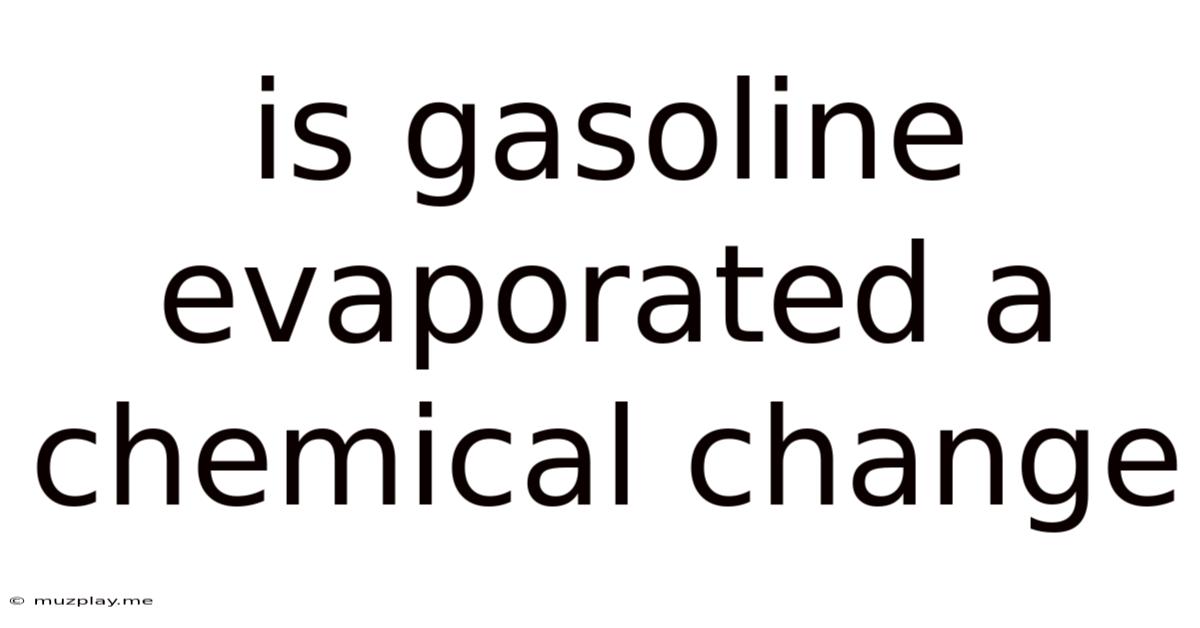Is Gasoline Evaporated A Chemical Change
Muz Play
May 09, 2025 · 4 min read

Table of Contents
Is Gasoline Evaporation a Chemical Change? Exploring the Science Behind Vaporization
The question of whether gasoline evaporation is a chemical or physical change is a common one, particularly when discussing the properties of matter and the processes they undergo. While seemingly simple, the answer requires a deeper understanding of the distinctions between chemical and physical changes, and the specific nature of gasoline itself. This article will delve into the scientific principles involved, examining the process of evaporation and its impact on the composition of gasoline.
Understanding Chemical vs. Physical Changes
Before we address the gasoline evaporation question, let's establish a clear understanding of the difference between chemical and physical changes.
Physical changes alter the form or appearance of a substance but do not change its chemical composition. Think of melting ice—it changes from a solid to a liquid, but it remains water (H₂O). Other examples include dissolving sugar in water, boiling water, and tearing paper. The substance remains fundamentally the same; only its physical state or form has altered.
Chemical changes, also known as chemical reactions, involve the transformation of one or more substances into entirely new substances with different chemical properties. This transformation typically involves the breaking and forming of chemical bonds. Examples include burning wood (producing ash, smoke, and gases), rusting iron, and cooking an egg. The original substance(s) are fundamentally altered, resulting in new products.
The Nature of Gasoline
Gasoline is a complex mixture of hydrocarbons—organic compounds composed solely of hydrogen and carbon atoms. These hydrocarbons are primarily alkanes, alkenes, and cycloalkanes, with varying chain lengths. The specific composition of gasoline varies depending on the crude oil source and the refining process. However, the key characteristic for our discussion is that gasoline is a mixture, not a single compound. This distinction is crucial for understanding its evaporation behavior.
Evaporation: A Physical Process
Evaporation is a physical change. It involves the transition of a substance from its liquid phase to its gaseous phase. This transition is driven by the kinetic energy of the molecules. In a liquid, molecules are constantly in motion, colliding with each other and the container walls. Some molecules possess sufficient kinetic energy to overcome the intermolecular forces holding them in the liquid state and escape into the gaseous phase. This is evaporation.
In the case of gasoline, the various hydrocarbon molecules within the mixture each have different boiling points. This means that during evaporation, the more volatile (lower boiling point) components will vaporize first, followed by the less volatile components. However, the individual hydrocarbon molecules themselves remain unchanged. No new chemical bonds are formed, and no new substances are created. The gasoline simply transitions from a liquid to a gas.
Factors Affecting Gasoline Evaporation Rate
Several factors can influence the rate of gasoline evaporation:
- Temperature: Higher temperatures increase the kinetic energy of molecules, leading to faster evaporation.
- Surface area: A larger surface area exposes more molecules to the atmosphere, increasing evaporation rate.
- Air flow: Moving air removes evaporated gasoline molecules from the vicinity of the liquid, preventing condensation and enhancing evaporation.
- Humidity: High humidity reduces the evaporation rate as the air is already saturated with water vapor, hindering the escape of gasoline molecules.
- Vapor pressure: Gasoline's vapor pressure is a measure of its tendency to evaporate. Higher vapor pressure signifies faster evaporation.
Misconceptions about Gasoline and Chemical Change
Some might argue that gasoline undergoes combustion (burning), a chemical change, when exposed to air and a spark. While true, combustion is a separate process entirely, distinct from evaporation. Evaporation is simply the transition to a gaseous state, while combustion involves a chemical reaction with oxygen, producing carbon dioxide and water (along with other byproducts). Therefore, the initial evaporation of gasoline is not a chemical change; the subsequent combustion is.
Another potential misconception involves the potential for gasoline to undergo oxidation. Over time, exposed gasoline can undergo slow oxidation reactions with atmospheric oxygen, leading to the formation of peroxides and other compounds. This is a chemical change, but it's a separate and slower process occurring after the initial evaporation. The primary act of gasoline transforming from liquid to gas remains a physical change.
Conclusion: Evaporation is a Physical Change
In conclusion, gasoline evaporation is unequivocally a physical change. The process involves the transition of gasoline from a liquid to a gaseous state, driven by the kinetic energy of its constituent molecules. While the composition of the vapor might slightly differ from the liquid due to varying boiling points of the components, no new chemical substances are formed. The hydrocarbon molecules remain fundamentally the same; they simply change their phase. Subsequent processes, such as combustion or slow oxidation, represent chemical changes, but these are separate events following the initial physical change of evaporation. Understanding this distinction is crucial in various contexts, including environmental impact assessments, safety considerations, and industrial applications involving gasoline handling and storage. The detailed understanding of gasoline's properties, its mixture nature, and the fundamental difference between physical and chemical changes confirms that evaporation is definitively a physical process.
Latest Posts
Latest Posts
-
1 Butanol To 1 Bromobutane Mechanism
May 09, 2025
-
Each Period In The Periodic Table Corresponds To
May 09, 2025
-
Prepare A Post Closing Trial Balance
May 09, 2025
-
The Basic Premise Of Experimental Design Is That It Can
May 09, 2025
-
Which Part Of The Brain Controls Respiration
May 09, 2025
Related Post
Thank you for visiting our website which covers about Is Gasoline Evaporated A Chemical Change . We hope the information provided has been useful to you. Feel free to contact us if you have any questions or need further assistance. See you next time and don't miss to bookmark.